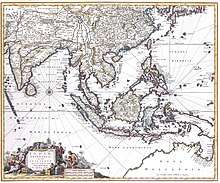| Order of Eleventh March | |
|---|---|
Two versions of the Supersemar document
| |
| Ratified | 11 March 1966 |
| Repealed | 28 October 1971 |
| Location | [See section] |
| Signatories | Sukarno |
| Purpose | To give a mandate for Lieutenant General Suharto, as Commander of Kopkamtib, to take all actions "deemed necessary" to address the security situation and stability of the government. |
| History of Indonesia |
|---|
 |
| Timeline |
|
|
| ||
|---|---|---|
|
Pre-Independence Domestic policy Foreign policy Family Media and legacy Gallery: Picture, Sound, Video |
||
The Order of Eleventh March (Indonesian: Surat Perintah Sebelas Maret), commonly referred to by its syllabic abbreviation Supersemar, was a document signed by the Indonesian President Sukarno on 11 March 1966, giving army commander Lt. Gen. Suharto authority to take whatever measures he "deemed necessary" to restore order to the chaotic situation during the Indonesian mass killings of 1965–66. The abbreviation "Supersemar" is also a play on the name of Semar, the mystic and powerful figure who commonly appears in Javanese mythology including wayang puppet shows. The invocation of Semar was presumably intended to help draw on Javanese mythology to lend support to Suharto's legitimacy during the period of the transition of authority from Sukarno to Suharto.
In effect, the Supersemar came to be seen as the key instrument of the transfer of executive power from Sukarno to Suharto.
The Provisional People's Consultative Assembly in its 1966 General Session subsequently elevated the Supersemar into a semi-constitutional resolution irrevocable by Sukarno. This resolution explicitly stated that the Supersemar would cease to have legal power following "the formation of a People's Consultative Assembly from a general election." Elections were held in 1971 and the members were sworn in on 28 October 1971.



